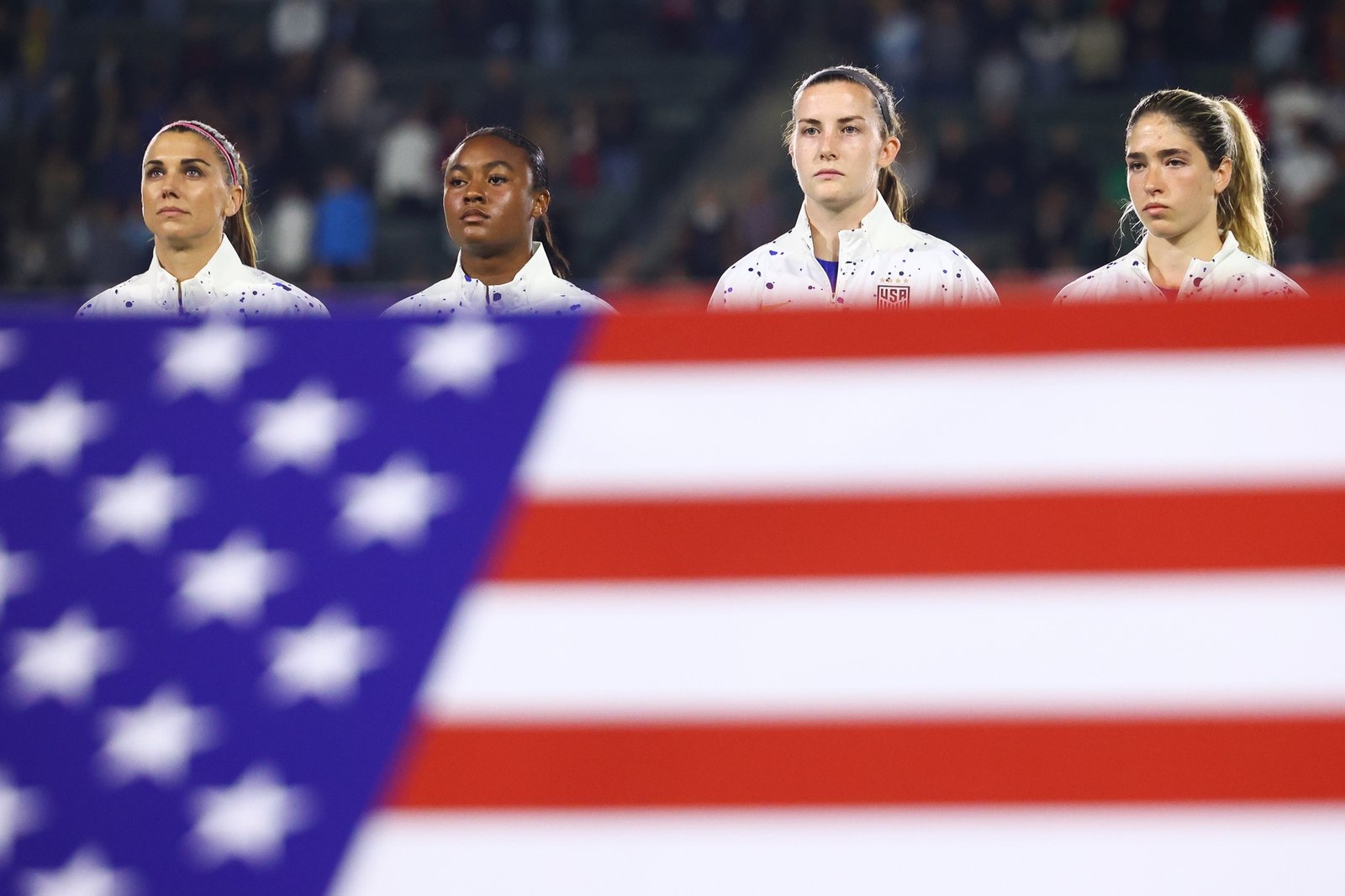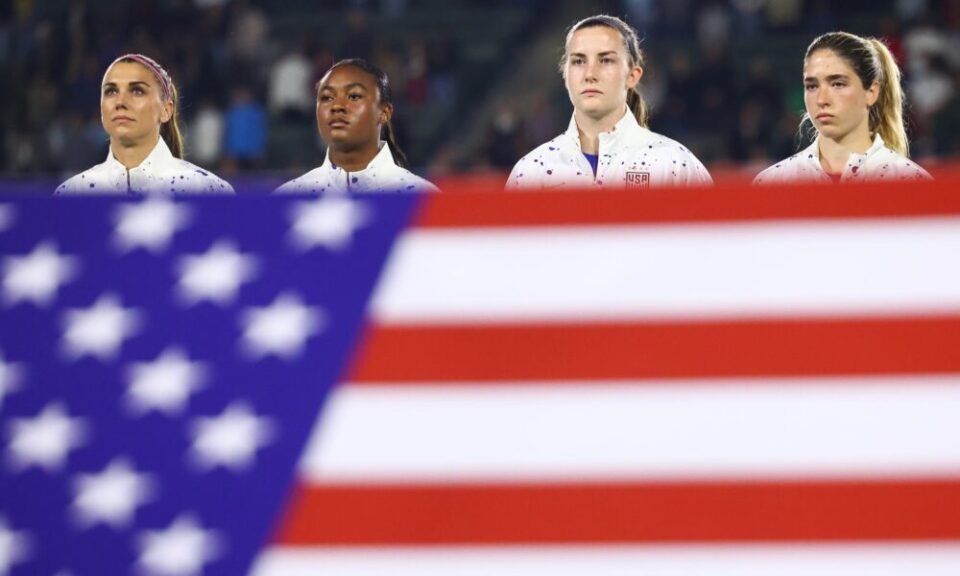
Jessica Alcheh-USA TODAY Sports
Alex Morgan has been here before. The existential questions about the future of the United States women’s national team, the panic about its eroding place near (certainly no longer at) the top of the world’s pecking order, the insinuation that there was doubt not only about, but perhaps within the team.
Morgan has been a forward and a focal point of this U.S. team for 14 years, guiding it to great successes: two World Cup titles and an Olympic gold medal. She’s been there for the highs, but she has seen some lows.
Fourteen years ago, in her first full year with the team, the U.S. lost an even higher-stakes game to Mexico, a Concacaf World Cup qualifying semifinal that sent the No. 1 team in the world into a two-leg playoff with Italy for the 16th and final spot in the 2011 World Cup. A 21-year-old Morgan scored a crucial, late goal in the first leg in Italy to help the U.S. advance to the World Cup, where the Americans lost to Japan in the final.
So, Monday’s loss to Mexico in the Concacaf W Gold Cup wasn’t unprecedented, even if it was rare and relatively shocking. To many, it was further confirmation of the United States’ fall from grace after its worst ever World Cup finish last year, exiting in the Round of 16. It was also a reminder that the growing pains are real for a U.S. team that finds itself in an awkwardly long transition as it awaits the late-May arrival of head coach elect Emma Hayes.
Morgan, the veteran she is, knew the types of questions that would come at Friday’s press conference ahead of the U.S.’ quarterfinal meeting with Colombia on Sunday. She’d been here before, including over the summer, when the entire world — not just those paying attention to Concacaf’s fledgling regional championship — scrutinized poor performances from the United States.
Most of the questions, including this one about whether the U.S. had something to prove after losing to Mexico, were cordial. Morgan was prepared — and she wasn’t defensive. Throughout these few years of transition and struggles for the U.S. — including times where coach’s plans might not have prominently included Morgan, who was only added to this Concacaf roster after Mia Fishel tore her ACL — the U.S. forward has fielded the questions (occasionally laced with criticism) with wisdom and patience.
This was no different. As the U.S. comes off a loss to Mexico, does it have something to prove to everybody?
“It’s kind of an interesting question to ask if we have something to prove because I think that we’re constantly proving to ourselves and to the rich history of this program, why each of us individually belong and why we belong as a team and why we show up to compete every day,” Morgan said. “And just because we’ve dropped a few games in the past doesn’t mean we don’t show up with the same intention every single day. And I think that that’s really important to remember, we have a very high expectation set on ourselves. Everyone does and that’s for good reason because we have won major tournaments, the most of any country in the history of women’s soccer.
“But of course, as everyone’s seen, and as we’d love to see, the quality of women’s football globally is just evolving and getting better and there’s more opportunity for women to play football year-round, and more footballers in the game in general for more respect and opportunity for growth and for financial stability.”
“So, with that, I don’t know if this next game is something that we’re saying that we need to prove something but of course every single game is just a step in a direction that we’re trying to make as this team right now, in this history of the U.S. women’s national team. Regardless of the last game, I think that our potential is extremely high. So, it’s putting all the pieces together and it’s working on things that we need to work on from the last game that we didn’t succeed at and kind of being able to excel in that next game, and hopefully beyond that.”
The loss to Mexico was concerning, particularly for how similar it felt to the poor performances at last year’s World Cup, where the U.S. struggled to solve pressure from opponents or adapt to different game states.
U.S. interim coach Twila Kilgore, who was an assistant coach on that World Cup team, on Friday pushed back on the idea that there were similarities between Monday’s loss and 2023 World Cup performances.
“I understand why, in some of the transitional moments, people can make that comparison,” Kilgore said. “I mean, the reality is for us, we are playing a totally different system, building a totally different way and got pressed totally different than we did at the World Cup even within those systems.
“So, no, I don’t really see the comparison there. And I think there’s a lot of things that we’ve already worked on that will help us continue to progress. Playing in different systems, having more tactical flexibility, and also executing some of the things that are just, you know, basic moments that help us be us.”
Both Kilgore and Morgan used the term “bumps in the road” to describe Monday’s loss to Mexico and other struggles the U.S. has endured. The focus, they said, was on themselves, not the opponent or the external pressure. Colombia is a familiar foe, having faced the U.S. twice in October and twice in June 2022. Still, Kilgore stressed that this is a different, evolving Colombia team.
Whatever plays out for the U.S. on Sunday, this W Gold Cup was always about development and preparation for the Olympics more than results. But there remains an expectation of greatness for any U.S. team, regardless of how experimental or inexperienced a given roster is. Monday’s loss to Mexico didn’t meet that expectation from a results perspective but, more concerningly, fell flat in the performance and execution departments.
A loss to Colombia on Sunday would bring a piling on of pressure for the Americans, but how they play — and how they respond not only to the loss to Mexico, but to whatever a talented Colombia team might throw at them — matters more. Improvement is a bare minimum.
Wins over Dominican Republic and Argentina to open the tournament were encouraging for the U.S., particularly given that each match featured a teenager taking center stage — Olivia Moultrie in the former and Jaedyn Shaw in the latter. Opponent strength aside, there were new ideas being executed by new players. Regardless of the difference in tactics Kilgore referenced, Monday’s loss to Mexico was reminiscent of the 2023 World Cup because of personnel and execution.
“Reality is, sometimes when you’re working on things, it doesn’t quite come off,” Kilgore said. “And sometimes the opponent is really good. And there’s those moments, but these are moments that are still moving in the right direction, and we understand that how we respond to them is everything. And while we’re known for winning, we’re also known for competing and bouncing back and being proud of who we are, and we’ll continue to step forward in the right direction.”


